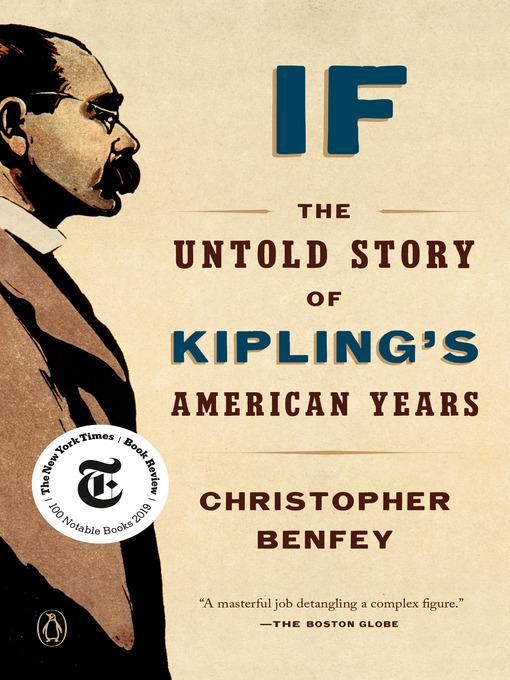
If
The Untold Story of Kipling's American Years
کتاب های مرتبط
- اطلاعات
- نقد و بررسی
- دیدگاه کاربران
نقد و بررسی

May 13, 2019
Benfey, a Mount Holyoke English professor, briskly and enjoyably recounts Rudyard Kipling’s romance with the United States. While often associated with India, Kipling’s birthplace and early home, he actually wrote two of his most famous depictions of that country, The Jungle Book and Kim (in its first draft), while living in Brattleboro, Vt., from 1892 to 1896. Benfey asserts that Kipling’s sense of America as a “lawless jungle” informed the first book’s depiction of a human boy being raised in an actual jungle, and that much of Kipling’s philosophy about character (expressed in his famous poem “If”) sprang from his admiration for such American writers as Mark Twain, whom Kipling sought out on his first American visit, in 1889. Kipling also exerted his own influence on Americans, perhaps most significantly in 1899, when Henry Cabot Lodge used Kipling’s imperialist poem “The White Man’s Burden” to convince his fellow U.S. senators to vote for occupying the Philippines. However, Benfey is concerned more with the personal than the political, emphasizing that the poem’s publication coincided with the death of Kipling’s American-born daughter, Josephine, during a visit by the Kiplings (then living in England) to Manhattan, a shattering loss that conclusively cut Kipling’s American ties. This is an admirably concise account of a complex and pivotal period in a famed writer’s career.

May 15, 2019
An examination of Rudyard Kipling's life and work through the lens of the years he spent living in the United States. Many scholars regard the once-popular writer as little more than the "jingoist Bard of Empire." In this book, Benfey (English/Mount Holyoke Coll.; Red Brick, Black Mountain, White Clay: Reflections on Art, Family, and Survival, 2012, etc.) discusses Kipling's little-discussed but highly productive "Vermont decade" to suggest that he became "the writer we know...because of his deep involvement with the United States." Benfey begins in 1889, the year Kipling traveled from Bombay to London via a route that took him east through the U.S., where he began a friendship with Mark Twain and visited the homes of other American literary idols including Ralph Waldo Emerson and Henry Wadsworth Longfellow. When he arrived in London in 1890, he met an American, whom he married in 1892. On a whim, the pair bought land in Vermont while on their honeymoon. But after Kipling's savings were unexpectedly wiped out by a financial panic, they returned to New England to settle. There, Kipling, determined to become an American writer, conceived or wrote some of his greatest works: Kim, a book that would later become a must-read for CIA operatives; Captain's Courageous, which he called his "first genuine out and out American story"; and the The Jungle Book, a novel Benfey argues arose in part as Kipling's response to Vermont surroundings that made him feel he was "living in a lawless jungle." On a visit to Washington, D.C., the writer met the imperialist war hawk and rising political star Theodore Roosevelt, whom he befriended. Kipling hated the "saber-rattling" he observed among American politicians, but he also believed--as he would suggest in his poem "The White Man's Burden"--that the U.S. needed to "assume its share of the responsibilities of empire." Intelligent and well-researched, Benfey's book accomplishes a delicate feat by highlighting the complexity of Kipling's life and work without seeking to minimize his colonialist, racist views. An accessible and enlightening biography.
COPYRIGHT(2019) Kirkus Reviews, ALL RIGHTS RESERVED.

May 1, 2019
Benfey (Andrew Mellon Professor of English, Mt. Holyoke Coll., MA) has written extensively on the U.S. Gilded Age (e.g., A Summer of Hummingbirds). This latest study focuses on Anglo-Indian author Rudyard Kipling (1865-1963) and his experiences in America from 1889 to 1999. With each chapter, Benfey highlights a single theme/perspective that illuminates America's effect on Kipling, his influence on American friends and colleagues such as Mark Twain, as well as significant events: a visit to the grave of poet Henry Wadsworth Longfellow, the death of companion Wolcott Balestier, going to the Washington Zoo. The final chapter concentrates on the Vietnam War and Kipling's reflections on the imperialism and complexity of this conflict on the American psyche. Interwoven throughout are insights into the writer's relationships with his family and political and literary figures, including Theodore Roosevelt, Henry James, and Henry Adams. VERDICT More sympathetic than critical, this biography will urge those unfamiliar with Kipling's works (e.g., If, Kim, The Jungle Book) to read the classics that solidified his reputation here and abroad, earning him the Nobel Prize in Literature in 1901. Highly recommended for anyone interested in late 19th-century literature. [See Prepub Alert, 1/7/19.]--Morris Hounion, New York City Coll. of Technology, Brooklyn
Copyright 2019 Library Journal, LLC Used with permission.

May 1, 2019
Rudyard Kipling may be considered the quintessential Anglo-Indian, but surprise! For a time, he settled in Vermont, where he penned both The Jungle Book and Captains Courageous, and he saw himself as an American author. Benfey, a Christian Gauss Award winner for his recent A Summer of Hummingbirds, here clarifies how Kipling influenced and was influenced by his American peers.
Copyright 2019 Library Journal, LLC Used with permission.

























دیدگاه کاربران